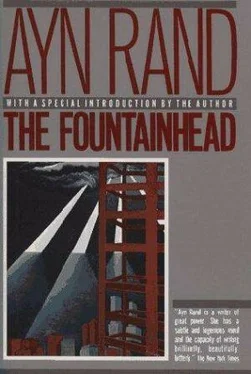The error is semantic: the use of the word "egotist" in Roark's courtroom speech, while actually the word should have been "egoist." The error was caused by my reliance on a dictionary which gave such misleading definitions of these two words that "egotist" seemed closer to the meaning I intended (Webster's Daily Use Dictionary, 1933). (Modern philosophers, however, are guiltier than lexicographers in regard to these two terms.)
The possibly misleading sentence is in Roark's speech: "From this simplest necessity to the highest religious abstraction, from the wheel to the skyscraper, everything we are and everything we have comes from a single attribute of man — the function of his reasoning mind."
This could be misinterpreted to mean an endorsement of religion or religious ideas. I remember hesitating over that sentence, when I wrote it, and deciding that Roark's and my atheism, as well as the overall spirit of the book, were so clearly established that no one would misunderstand it, particularly since I said that religious abstractions are the product of man's mind, not of supernatural revelation.
But an issue of this sort should not be left to implications. What I was referring to was not religion as such, but a special category of abstractions, the most exalted one, which, for centuries, had been the near-monopoly of religion: ethics — not the particular content of religious ethics, but the abstraction "ethics," the realm of values, man's code of good and evil, with the emotional connotations of height, uplift, nobility, reverence, grandeur, which pertain to the realm of man's values, but which religion has arrogated to itself.
The same meaning and considerations were intended and are applicable to another passage of the book, a brief dialogue between Roark and Hopton Stoddard, which may be misunderstood if taken out of context:
"'You're a profoundly religious man, Mr. Roark — in your own way. I can see that in your buildings.'
"'That's true,' said Roark."
In the context of that scene, however, the meaning is clear: it is Roark's profound dedication to values, to the highest and best, to the ideal, that Stoddard is referring to (see his explanation of the nature of the proposed temple). The erection of the Stoddard Temple and the subsequent trial state the issue explicitly.
This leads me to a wider issue which is involved in every line of The Fountainhead and which has to be understood if one wants to understand the causes of its lasting appeal.
Religion's monopoly in the field of ethics has made it extremely difficult to communicate the emotional meaning and connotations of a rational view of life. Just as religion has preempted the field of ethics, turning morality against man, so it has usurped the highest moral concepts of our language, placing them outside this earth and beyond man's reach. "Exaltation" is usually taken to mean an emotional state evoked by contemplating the supernatural. "Worship" means the emotional experience of loyalty and dedication to something higher than man. "Reverence" means the emotion of a sacred respect, to be experienced on one's knees. "Sacred" means superior to and not-to-be-touched-by any concerns of man or of this earth. Etc.
But such concept do name actual emotions, even though no supernatural dimension exists; and these emotions are experienced as uplifting or ennobling, without the self-abasement required by religious definitions. What, then, is their source or referent in reality? It is the entire emotional realm of man's dedication to a moral ideal. Yet apart from the man-degrading aspects introduced by religion, that emotional realm is left unidentified, without concepts, words or recognition.
It is this highest level of man's emotions that has to be redeemed from the murk of mysticism and redirected at its proper object: man.
It is in this sense, with this meaning and intention, that I would identify the sense of life dramatized in The Fountainhead as man-worship.
It is an emotion that a few — a very few — men experience consistently; some men experience it in rare, single sparks that flash and die without consequences; some do not know what I am talking about; some do and spend their lives as frantically virulent spark-extinguishers.
Do not confuse "man-worship" with the many attempts, not to emancipate morality from religion and bring it into the realm of reason, but to substitute a secular meaning for the worst, the most profoundly irrational elements of religion. For instance, there are all the variants of modern collectivism (communist, fascist, Nazi, etc.), which preserve the religious-altruist ethics in full and merely substitute "society" for God as the beneficiary of man's self-immolation. There are the various schools of modern philosophy which, rejecting the law of identity, proclaim that reality is an indeterminate flux ruled by miracles and shaped by whims — not God's whims, but man's or "society's." These neo-mystics are not man-worshipers; they are merely the secularizers of as profound a hatred for man as that of their avowedly mystic predecessors.
A cruder variant of the same hatred is represented by those concrete-bound, "statistical" mentalities who — unable to grasp the meaning of man's volition — declare that man cannot be an object of worship, since they have never encountered any specimens of humanity who deserved it.
The man-worshipers, in my sense of the term, are those who see man's highest potential and strive to actualize it. The man-haters are those who regard man as a helpless, depraved, contemptible creature — and struggle never to let him discover otherwise. It is important here to remember that the only direct, introspective knowledge of man anyone possesses is of himself.
More specifically, the essential division between these two camps is: those dedicated to the exaltation of man's self-esteem and the sacredness of his happiness on earth — and those determined not to allow either to become possible. The majority of mankind spend their lives and psychological energy in the middle, swinging between these two, struggling not to allow the issue to be named. This does not change the nature of the issue.
Perhaps the best way to communicate The Fountainhead's sense of life is by means of the quotation which had stood at the head of my manuscript, but which I removed from the final, published book. With this opportunity to explain it, I am glad to bring it back.
I removed it, because of my profound disagreement with the philosophy of its author, Friedrich Nietzsche. Philosophically, Nietzsche is a mystic and an irrationalist. His metaphysics consists of a somewhat "Byronic" and mystically "malevolent" universe; his epistemology subordinates reason to "will," or feeling or instinct or blood or innate virtues of character. But, as a poet, he projects at times (not consistently) a magnificent feeling for man's greatness, expressed in emotional, not intellectual terms.
This is especially true of the quotation I had chosen. I could not endorse its literal meaning: it proclaims an indefensible tenet — psychological determinism. But if one takes it as a poetic projection of an emotional experience (and if, intellectually, one substitutes the concept of an acquired "basic premise" for the concept of an innate "fundamental certainty"), then that quotation communicates the inner state of an exalted self-esteem — and sums up the emotional consequences for which The Fountainhead provides the rational, philosophical base:
"It is not the works, but the belief which is here decisive and determines the order of rank — to employ once more an old religious formula with a new and deeper meaning, — it is some fundamental certainty which a noble soul has about itself, something which is not to be sought, is not to be found, and perhaps, also, is not to be lost. — The noble soul has reverence for itself. — " (Friedrich Nietzsche, Beyond Good and Evil.)
Читать дальше










